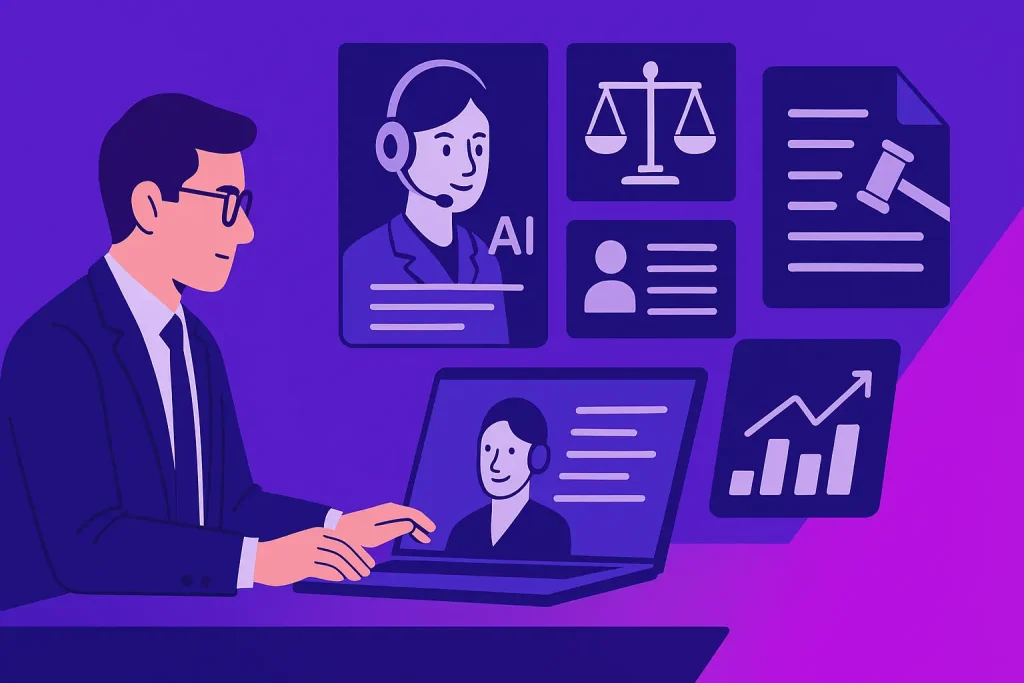
The legal industry has entered a new era of transformation. Traditional law firm operations that once depended on manual processes, phone calls, and paperwork are now being replaced by automated, data-driven systems. At the heart of this evolution are AI-powered legal workflows designed to simplify complex tasks, increase productivity, and improve client satisfaction.
For decades, lawyers have relied heavily on administrative staff and long working hours to keep their firms running efficiently. But artificial intelligence is changing that. With AI tools such as virtual legal assistants, AI call centers, and intelligent document automation, law firms can now save time, reduce operational costs, and serve more clients with the same or even fewer resources.
This article explores how AI-powered legal workflows streamline communication, case management, and client engagement, helping modern law firms operate smarter and achieve higher returns.
Understanding AI-Powered Legal Workflows
An AI-powered legal workflow uses artificial intelligence and machine learning technologies to automate repetitive tasks within a law firm’s daily operations. These workflows can handle everything from client intake and call management to case tracking, document drafting, and billing.
Unlike traditional systems that require constant human intervention, AI workflows operate independently once they’re trained on firm-specific data and processes. They learn patterns, recognize priorities, and make intelligent decisions to keep operations running smoothly.
For example, an AI-powered call center like TeleWizard can answer client calls 24/7, record essential case information, and schedule consultations. Meanwhile, AI-driven document management tools can draft contracts, organize evidence, and generate case summaries automatically.
Together, these systems free up valuable time, allowing attorneys and legal teams to focus on what they do best serving clients and winning cases.
How AI Saves Time in Legal Operations
Time is one of the most valuable assets in any law firm. Every hour spent on administrative work is an hour not billed or spent with a client. AI-powered workflows automate time-consuming tasks, drastically cutting the amount of manual labor required.
1. Automated Client Intake and Call Management
AI call centers can answer client calls instantly, collect information through natural conversation, and record all relevant data in the firm’s CRM. This eliminates the need for human receptionists to handle every inquiry, saving hours of staff time daily.
Clients receive immediate attention and reassurance, even outside of office hours, while lawyers can begin each day with a queue of well-documented leads ready for review.
2. Faster Document Creation and Review
Drafting contracts, agreements, and pleadings can take hours or even days. AI document automation tools use templates and natural language processing to draft and review legal documents in minutes. The system ensures accuracy and compliance, reducing the need for extensive proofreading.
This not only saves time but also minimizes the risk of human error.
3. Smart Scheduling and Reminders
AI-powered calendars can automatically schedule consultations, send reminders, and adjust appointments when necessary. Attorneys no longer need to coordinate manually with clients, which often leads to scheduling conflicts.
By syncing with email, messaging, and video conferencing tools, AI ensures everyone stays on schedule without manual follow-up.
Reducing Costs with AI Efficiency
AI workflows are not just about speed; they’re about savings. Law firms spend a significant portion of their budgets on administrative labor, communication, and document management. By automating these tasks, AI significantly cuts operational costs.
1. Reduced Staffing Costs
AI replaces repetitive administrative tasks, reducing the need for full-time receptionists, paralegals, and intake staff. Instead of hiring more employees to handle growing workloads, firms can rely on AI systems to manage communication and data entry.
A law firm that uses an AI call center, for example, can save thousands of dollars per month compared to outsourcing or maintaining a large front-office team.
2. Lower Overhead Expenses
Automation reduces paper use, storage needs, and physical office space requirements. Digital workflows mean fewer printing costs, fewer filing cabinets, and less dependency on physical archives.
Cloud-based AI systems also minimize the need for in-house servers, reducing IT maintenance costs while improving accessibility and security.
3. Minimized Human Errors
Human mistakes in data entry, billing, or documentation can be costly, both financially and reputationally. AI reduces these errors by maintaining consistency and accuracy across all workflows.
This precision leads to fewer compliance risks, smoother audits, and higher client satisfaction, all of which contribute to cost savings and improved profitability.
Winning More Clients with AI-Enhanced Communication
In today’s competitive legal market, speed and responsiveness are key to client acquisition. Clients expect instant answers and professional communication. AI-powered systems enable law firms to meet those expectations seamlessly.
1. 24/7 Client Availability
Traditional law firms operate during fixed hours, but clients’ legal needs don’t follow a schedule. With AI call centers and chat assistants, your firm is available around the clock.
When potential clients reach out at midnight or during weekends, AI ensures that their calls are answered immediately, and their concerns are logged for follow-up. This 24/7 presence builds trust and increases conversion rates significantly.
2. Personalized Client Interactions
AI systems analyze each client’s history, preferences, and case details to personalize communication. They remember previous interactions and adjust responses accordingly.
This creates a client experience that feels human and attentive, even though the system is automated. Personalized service increases loyalty and drives more referrals.
3. Faster Follow-Ups and Case Updates
AI workflows can send automatic follow-ups, reminders, or status updates through SMS or email. Clients stay informed about their case progress without having to call repeatedly for updates.
This proactive communication not only improves satisfaction but also reduces the workload on human staff.
Data-Driven Decision Making
One of AI’s biggest advantages is its ability to turn data into actionable insights. Every call, document, and case note becomes a source of valuable information that can guide better business decisions.
Law firms can use AI analytics to understand:
- The types of cases generating the most revenue
- The average time spent per client or case type
- Which marketing channels bring the most qualified leads
- Peak times for client inquiries
By understanding these patterns, firms can allocate resources more efficiently, focus on high-value cases, and plan future growth strategies based on evidence rather than guesswork.
Real-World Example: Streamlining with AI
Let’s look at a mid-sized personal injury firm that adopted an AI-powered workflow system. Before AI integration, their intake team manually handled hundreds of calls weekly, resulting in missed leads and inconsistent data entry.
After implementing TeleWizard’s AI call center and intake automation tools, the firm achieved remarkable improvements.
| Metric | Before AI | After AI Integration |
| Missed Calls | 32% | 0% |
| Average Response Time | 4 hours | Instant |
| Client Conversion Rate | 18% | 43% |
| Administrative Costs | $9,000/month | $3,500/month |
| Client Satisfaction Score | 78% | 96% |
The result was a 55 percent increase in new cases within just three months. The firm also reduced overhead costs by nearly 60 percent.
Clients appreciated the quick response, and attorneys gained more time to focus on legal work instead of administrative tasks.
Building Stronger Client Relationships Through AI
AI is not just about automation; it’s about connection. Clients want clear communication, reassurance, and reliability. AI enhances all three.
When an AI system handles repetitive work efficiently, it allows lawyers to spend more quality time building relationships with clients. AI also ensures that every call, email, and document is logged and retrievable, reducing the chances of miscommunication.
This consistent communication builds trust and helps law firms maintain long-term client relationships. It also supports referral growth, as satisfied clients are more likely to recommend firms that respond promptly and professionally.
Ensuring Security and Compliance
In the legal world, data privacy and compliance are critical. AI-powered systems used in law firms are designed with advanced security measures such as encryption, access controls, and GDPR compliance.
AI call centers and document management tools ensure that sensitive client information remains confidential and is handled according to legal and ethical standards.
By eliminating manual data transfers and paper-based workflows, AI also reduces the risk of human-related data breaches.
The Future of AI-Powered Legal Workflows
The evolution of AI in law is just beginning. Future systems will not only manage workflows but also predict client needs, suggest legal strategies, and automate more complex legal research tasks.
The next generation of AI tools will integrate voice recognition, sentiment analysis, and predictive analytics to provide even more advanced client experiences.
Law firms that embrace AI today are positioning themselves to stay ahead of competitors tomorrow.
Key Benefits of AI-Powered Legal Workflows
| Benefit Category | Impact on Law Firms |
| Time Savings | Automates intake, scheduling, and documentation |
| Cost Reduction | Cuts administrative and labor expenses |
| Client Acquisition | Improves response times and trust |
| Accuracy | Reduces human errors in data and communication |
| Scalability | Handles more clients without hiring more staff |
| Data Insights | Helps firms make better business decisions |
Conclusion
AI-powered legal workflows represent more than just a technological upgrade; they are a complete transformation in how law firms function and compete.
By automating repetitive tasks, reducing costs, and delivering faster, more personalized service, AI enables legal professionals to focus on what truly matters building strong client relationships and winning cases.
Law firms that adopt AI-driven systems like TeleWizard are not only saving time and cutting expenses but also creating a foundation for sustainable growth. In a world where responsiveness and precision define success, AI isn’t just the future of legal practice; it’s the competitive advantage of today.



